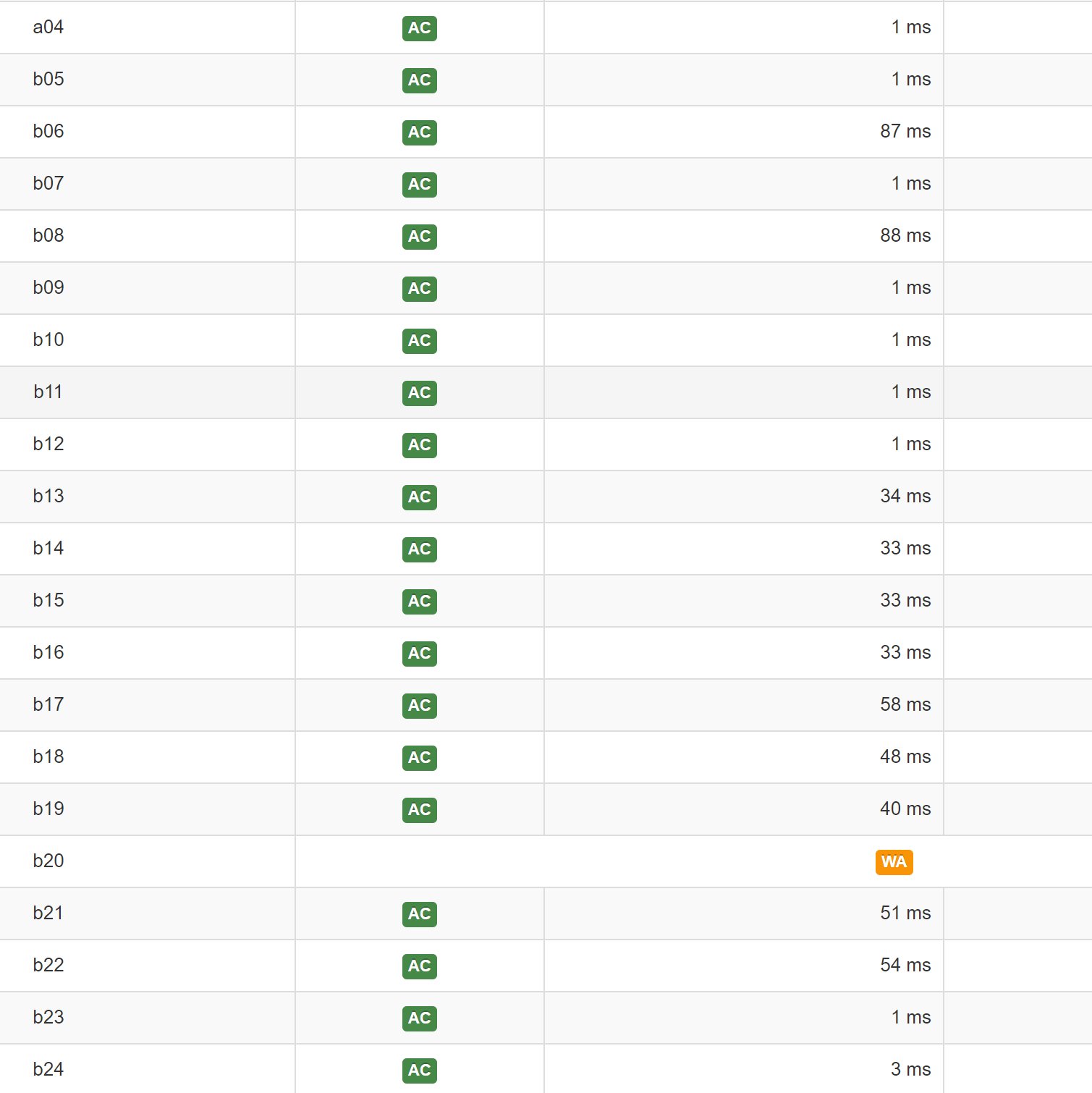結果
| 問題 | No.1756 Rider's Triangle |
| コンテスト | |
| ユーザー |
 heno239 heno239
|
| 提出日時 | 2021-11-20 13:39:09 |
| 言語 | C++17 (gcc 15.2.0 + boost 1.89.0) |
| 結果 |
AC
|
| 実行時間 | 2 ms / 2,000 ms |
| コード長 | 4,544 bytes |
| 記録 | |
| コンパイル時間 | 1,914 ms |
| コンパイル使用メモリ | 149,288 KB |
| 最終ジャッジ日時 | 2025-01-25 21:36:31 |
|
ジャッジサーバーID (参考情報) |
judge4 / judge1 |
(要ログイン)
| ファイルパターン | 結果 |
|---|---|
| sample | AC * 4 |
| other | AC * 25 |
ソースコード
#pragma GCC optimize("O3")
#pragma GCC optimize("unroll-loops")
#include<iostream>
#include<string>
#include<cstdio>
#include<vector>
#include<cmath>
#include<algorithm>
#include<functional>
#include<iomanip>
#include<queue>
#include<ciso646>
#include<random>
#include<map>
#include<set>
#include<bitset>
#include<stack>
#include<unordered_map>
#include<unordered_set>
#include<utility>
#include<cassert>
#include<complex>
#include<numeric>
#include<array>
#include<chrono>
using namespace std;
//#define int long long
typedef long long ll;
typedef unsigned long long ul;
typedef unsigned int ui;
const ll mod = 998244353;
const ll INF = mod * mod;
typedef pair<int, int>P;
#define rep(i,n) for(int i=0;i<n;i++)
#define per(i,n) for(int i=n-1;i>=0;i--)
#define Rep(i,sta,n) for(int i=sta;i<n;i++)
#define rep1(i,n) for(int i=1;i<=n;i++)
#define per1(i,n) for(int i=n;i>=1;i--)
#define Rep1(i,sta,n) for(int i=sta;i<=n;i++)
#define all(v) (v).begin(),(v).end()
typedef pair<ll, ll> LP;
typedef double ld;
typedef pair<ld, ld> LDP;
const ld eps = 1e-4;
const ld pi = acosl(-1.0);
template<typename T>
void chmin(T& a, T b) {
a = min(a, b);
}
template<typename T>
void chmax(T& a, T b) {
a = max(a, b);
}
ll mod_pow(ll x, ll n, ll m = mod) {
if (n < 0) {
ll res = mod_pow(x, -n, m);
return mod_pow(res, m - 2, m);
}
if (abs(x) >= m)x %= m;
if (x < 0)x += m;
ll res = 1;
while (n) {
if (n & 1)res = res * x % m;
x = x * x % m; n >>= 1;
}
return res;
}
struct modint {
ll n;
modint() :n(0) { ; }
modint(ll m) :n(m) {
if (n >= mod)n %= mod;
else if (n < 0)n = (n % mod + mod) % mod;
}
operator int() { return n; }
};
bool operator==(modint a, modint b) { return a.n == b.n; }
modint operator+=(modint& a, modint b) { a.n += b.n; if (a.n >= mod)a.n -= mod; return a; }
modint operator-=(modint& a, modint b) { a.n -= b.n; if (a.n < 0)a.n += mod; return a; }
modint operator*=(modint& a, modint b) { a.n = ((ll)a.n * b.n) % mod; return a; }
modint operator+(modint a, modint b) { return a += b; }
modint operator-(modint a, modint b) { return a -= b; }
modint operator*(modint a, modint b) { return a *= b; }
modint operator^(modint a, ll n) {
if (n == 0)return modint(1);
modint res = (a * a) ^ (n / 2);
if (n % 2)res = res * a;
return res;
}
ll inv(ll a, ll p) {
return (a == 1 ? 1 : (1 - p * inv(p % a, a)) / a + p);
}
modint operator/(modint a, modint b) { return a * modint(inv(b, mod)); }
modint operator/=(modint& a, modint b) { a = a / b; return a; }
const int max_n = 1 << 10;
modint fact[max_n], factinv[max_n];
void init_f() {
fact[0] = modint(1);
for (int i = 0; i < max_n - 1; i++) {
fact[i + 1] = fact[i] * modint(i + 1);
}
factinv[max_n - 1] = modint(1) / fact[max_n - 1];
for (int i = max_n - 2; i >= 0; i--) {
factinv[i] = factinv[i + 1] * modint(i + 1);
}
}
modint comb(int a, int b) {
if (a < 0 || b < 0 || a < b)return 0;
return fact[a] * factinv[b] * factinv[a - b];
}
modint combP(int a, int b) {
if (a < 0 || b < 0 || a < b)return 0;
return fact[a] * factinv[a - b];
}
int dx[4] = { 1,0,-1,0 };
int dy[4] = { 0,1,0,-1 };
ll gcd(ll a, ll b) {
a = abs(a);
b = abs(b);
if (a < b)swap(a, b);
while (b) {
ll r = a % b; a = b; b = r;
}
return a;
}
void solve() {
int a, b; ll n; cin >> a >> b >> n;
if (a == b||a==0) {
cout << 0 << "\n"; return;
}
ll mi = INF;
modint ans = 0;
vector<P> vp = { {a,b},{b,a},{a,-b},{b,-a} };
rep(i, 4)rep(j, 4)rep(k, 4) {
if (i == j || j == k || k == i)continue;
ll s[3] = { vp[i].first,vp[j].first,vp[k].first };
ll t[3] = { vp[i].second,vp[j].second,vp[k].second };
ll x = s[2] * t[1] - s[1] * t[2];
ll y = s[0] * t[2] - s[2] * t[0];
ll z = s[1] * t[0] - s[0] * t[1];
ll g = gcd(gcd(x, y), z);
x /= g;
y /= g;
z /= g;
assert(x != 0 && y != 0 && z != 0);
ll cx[3], cy[3];
cx[0] = 0, cy[0] = 0;
ll dx1 = x * s[0];
ll dy1 = x * t[0];
ll dx2 = -z * s[2];
ll dy2 = -z * t[2];
cx[1] = dx1, cx[2] = dx2, cy[1] = dy1, cy[2] = dy2;
ll area = abs(dx1 * dy2 - dx2 * dy1);
modint num = 0;
ll lenx = max({ cx[0],cx[1],cx[2] }) - min({ cx[0],cx[1],cx[2] });
ll leny = max({ cy[0],cy[1],cy[2] }) - min({ cy[0],cy[1],cy[2] });
num = ((modint)n - (modint)lenx) * ((modint)n - (modint)leny);
if (area < mi) {
mi = area;
ans = num;
}
else if (area == mi) {
ans += num;
}
}
ans /= 3;
cout << ans << "\n";
}
signed main() {
ios::sync_with_stdio(false);
cin.tie(0);
//cout << fixed << setprecision(10);
//init_f();
//init();
//int t; cin >> t; rep(i, t)
solve();
return 0;
}
